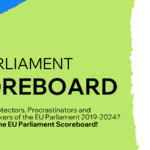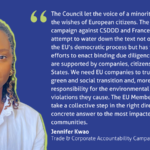Yesterday EU Member States’ ambassadors discussed a draft position on the future of one of the EU’s cornerstone measures for the implementation of the Paris Agreement, the Effort Sharing Regulation (ESR), which sets national targets to reduce emissions from transport, waste, agriculture, buildings and small industry.
The text, which received large support from the ambassadors, forms a basis for the position of EU Environment Ministers, expected to be agreed upon during their meeting in Brussels on 13th October.
Commenting on the draft position, Caroline Westblom, EU Climate & Energy Policy Coordinator at Climate Action Network (CAN) Europe said:
“The latest text clearly shows that EU Member States play a two-faced game on climate: they claim commitment to the Paris Agreement, but avoid real climate action at home.
Rather than discussing how to correct the flaws of the original proposal from the Commission, governments are creating additional loopholes which would allow them to use a multitude of accounting tricks and avoid emission cuts.
Ministers have to step up and at the very least, improve what is on the table by aligning the starting point with real emissions levels. ”
So far EU countries have turned a blind eye to the need for raising the level of ambition of emission reductions under the ESR. This is despite of the fact that the current ESR target of reducing emissions by 30% by 2030 is too low to match the Paris Agreement long-term objective to keep global average temperature rise well below 2 degrees Celsius.
The latest text does not include any proposals to correct the inflated starting point for emission reductions nor limit the loopholes which would allow countries to reduce their reduction efforts through using credits from the land use sector or surplus allowances from the Emissions Trading Scheme. Instead, countries have introduced a new loophole that would allow some of them to carry over unused pollution permits from the past. Together these concessions lower the already weak 30% target to a mere 23%.
ENDS
Contacts:
Caroline Westblom, CAN Europe EU Climate & Energy Policy Coordinator, caroline@caneurope.org, +32 2894 4674
Ania Drazkiewicz, CAN Europe Communications Coordinator, ania@caneurope.org, +32 494 525 738
Notes:
The latest text leaked by Politico: http://g8fip1kplyr33r3krz5b97d1.wpengine.netdna-cdn.com/wp-content/uploads/2017/09/DRAFT_EFFORT.pdf
Infographic: “No cheating from the start”, which shows that a misguided starting point for the Effort Sharing Regulation (ESR) would increase EU emissions by 500M+ tonnes compared to starting from real emission levels: https://caneurope.org/publications/presentations/1420-infographic-no-cheating-from-the-start
CAN Europe press release on the European Parliament’s vote on the future of the Effort Sharing Regulation https://caneurope.org/publications/press-releases/1423-parliament-eu-climate-policy-paris-pledge
CAN Europe Position on the Effort Sharing Regulation (2021-30) https://caneurope.org/publications/can-europe-positions/1234-can-europe-position-on-the-effort-sharing-regulation-2021-30
Climate Action Network (CAN) Europe is Europe’s largest coalition working on climate and energy issues. With over 130 member organisations in more than 30 European countries – representing over 44 million citizens – CAN Europe works to prevent dangerous climate change and promote sustainable climate and energy policy in Europe.


